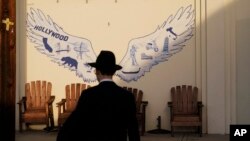The Jewish diaspora awoke to horror Saturday in what was supposed to be among the most festive times on the Jewish holiday calendar.
The attacks by the militant group Hamas came after the end of Sukkot, a weeklong celebration to commemorate the harvest season and the time Jews lived in the desert after being freed from slavery in Egypt.
It also came as Jews in the United States were gearing up to celebrate the holiday of Simchat Torah, which marks the beginning of a new annual cycle of the reading of the scrolls and is celebrated in Israel a day earlier.
At synagogues around the globe, the attacks brought a somber tone.
Rabbi Felicia L. Sol opened the morning at B'nai Jeshurun in New York City by telling congregants of the devastating toll from a Hamas attack that came from the air, sea and land.
At a time that was supposed to be filled with joy, so many were instead entering "the holiday knowing that we can't possibly celebrate in the same way that we would if obviously this hadn't happened," she said.
The day, she said, would go on "with less melody" as congregants joined her in "praying that things will be resolved, that those who are wounded will heal and for all the pain that already exists that we'll find our way through."
The incursion during Simchat Torah in Israel revived painful memories of the 1973 Mideast war practically 50 years to the day, in which Egypt and Syria launched a surprise attack on Yom Kippur, the holiest day in Judaism and a time of atonement and forgiveness.
"I think that's often been the case in these wars, that Israel often gets attacked on a holiday or Sabbath." said Jack Rosen, president of the American Jewish Congress. "And so I don't think that's an accident."
The attack drew condemnation from Jewish communities and organizations spanning from Miami to Vancouver. The Jewish population in the United States was estimated at 7.5 million in 2021 by the Pew Research Center, with significant communities in the New York and Los Angeles areas.
The holiday of Sukkot begins five days after Yom Kippur and is named after the huts, or sukkah, that represent the shelters that freed Jews used in their 40 years in the wilderness. Sometimes the temporary shelters are adorned with fruits, lights and other festively colored decorations.
During the Simchat Torah holiday, people gather to dance with the scrolls marking the end of an annual reading cycle and the beginning of the next.
Maxim Jacobs, 48, said the mood was mournful during Saturday morning services at his synagogue in New Jersey, with worshippers worried about family in Israel.
But he expected a festive evening celebration for Simchat Torah. He said the rabbi told congregants other than traveling to Israel to help defend the country, being joyous is how people can carry on.
"We need to get closer together, have joy, tell the terrorists they won't get us down," Jacobs said. "We will go on as Jews."
At Westchester Reform Temple in Scarsdale, New York, worshippers opened their service Saturday both welcoming the arrival of the holiday and mourning the attack.
"We are holding joy and sorrow at the same time as we often do in Judaism," Associate Cantor Danielle Rodnizki said.




